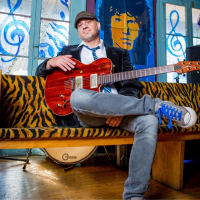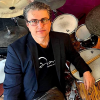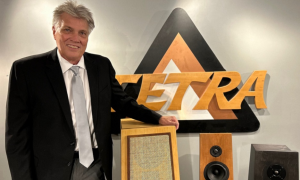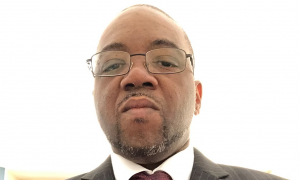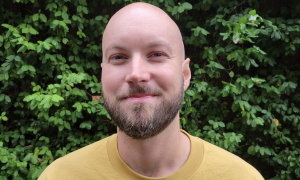Home » Jazz Articles » Chats with Cats » The YouTuber: Andy Edwards
The YouTuber: Andy Edwards

I’m a fusion fan, and fusion really gets a rough deal in when it comes to the support and marketing of jazz. Someone like Wynton Marsalis is getting over a million dollars a year to oversee Jazz at Lincoln Center when a genius like Allan Holdsworth died in poverty, after a lifetime of playing in tiny clubs to make ends meet.
—Andy Edwards
But, while these platforms provide more exposure than ever, their bite—sized clips only present a one-dimensional view of what it means to be a musician and to make music. They are often just attention grabbing snippets of a young virtuoso playing something very fast and usually by themselves.
But, the internet has also allowed for creators and educators with real knowledge and a distinct point of view to provide genuine perspective and analysis to those who want to learn. One such content creator is Andy Edwards. Andy is a professional drummer and educator playing with the likes of Robert Plant. But, his deep knowledge of music including Jazz, Prog, Metal, etc. has given him a new career to add to his resume; YouTuber. His videos can range from comedic to profound but he's always genuine, opinionated, well-informed, and therefore very entertaining.
About Andy Edwards
Andy Edwards came to prominence as Robert Plant's drummer between 1997 and 2001. During this time he worked exclusively for Plant, performing all over the world on over 100 gigs. These included performances headlining many of the major music festivals across Europe.During this time Andy began his relationship with Tama and he has performed in many drum clinics as a demonstrator for Tama. In this capacity he has performed at all the major drum events in the UK. In 2005 he played at the UK's biggest ever clinic and he has performed alongside Mike Portnoy, Greg Bisonette, Terry Bozzio, Thomas Lang, Kenny Aronoff, Steve Smith, and Simon Phillips amongst many others.
More recently he has made waves in the progressive music scene contributing to many award winning albums and DVDs and he has featured in many of the 'best prog rock' polls for various publications. He has toured and recorded with prog rock legends IQ and was a founding member of the cult prog band Frost, recording two widely acclaimed albums Milliontown, and Experiments in Mass Appeal More recently Andy has also recorded for prog band Magenta, releasing the album The Twenty Seven Club formed the prog supergroup KIAMA and has worked with bassist Steve Lawson in a variety of improvised settings. He currently performs alongside Bev Bevan (The Move, ELO, Black Sabbath) in Quill and is a founder member of the prog rock band Rain.
All About Jazz: You have an, almost, encyclopedic knowledge of music. How did this come to be?
Andy Edwards: I think being a British music fan growing up pre internet, when I discovered prog, fusion and jazz, the only way to find out about artists to listen to was to get music encyclopedia's and go through the entries there. I had loads of them, The Rolling Stone Guide to Rock n Roll, The Observer's Book of Jazz, etc, and just read them over and over.
I think I was a bit nerdy too and loved lists, so I would make lists of certain artists, and the albums they made, with dates and session credits etc. If you discover a drummer like say Steve Gadd, the only way to hear him is to find out albums he played on and then search them out.
Then for many years I taught a unit at college called 'The History of Popular Music in the UK 1950-present.' But I taught it from 1917 onwards. Teaching that every year gave me a good idea about other music forms, and the way they related together historically.
But I think I have an interest in this stuff a bit too much than is healthy. So when I find a fact out like, for example, Chico Hamilton's brother played captain Dobie in Starsky and Hutch, I find myself fascinated by these sort of connections, Of course the saxophonist Tom Scott wrote the music to Starsky and Hutch, another great fusion player. The percussionist on the Starsky and Hutch. theme was Ralph Macdonald, who wrote "Just the Two of Us" for Bill Withers. This tune was sampled by Eminem on his debut album, which also sampled 'I got the... ' by Labi Siffre. That iconic riff sampled by Eminem for his "My Name Is" debut single was actually played by Chas Hodges from the UK cockney comedy duo, Chas and Dave. I find this stuff fascinating.
AAJ: You've been a professional musician and educator for decades. How do you feel about this new career as a YouTuber?
AE: I love YouTubing, I'm really interested in how YouTube works, and how you can be creative in that sphere. It's given me a new lease of life. I like Jazz because you get to go on a journey where you don't know where you are going, and my You Tube videos are like that too. It's a great feeling when you get on a roll, and you are discovering stuff about music as the video develops. When it's good it is like a great jazz gig.
To be honest You Tube came along at a time when I needed it, and now I'm making a bit of money out of it, I have my gang over at Patreon who love music like me. It's all really positive as far as I'm concerned. And as my You tube has developed people are finding out I actually make music and they check that out too, so my music is getting a new lease of life as well.
AAJ: What made you want to start a YouTube channel?
AE: I have had a channel, like most people, since 2014. I would drop the odd video on there like anyone else, then get depressed because it got like 17 views. I play in a prog band Rain, and when our album came out, I was interviewed by a great YouTuber called 'Sea of Tranquility.' I then noticed that they also did album ranking videos, so I decided to do one on The Mahavishnu Orchestra. It was in Covid, so I was stuck in the house with not much to do. I filmed it and banged it up, and forgot about it. Then one day I logged into You Tube for some reason, and it had 5000 views. So I did one on Weather Report and that did well too. So I then decided to try and film three videos a week to see what happened, and the channel just came alive. And it has snowballed since then.
AAJ: You have strong opinions about the state of jazz today. What is your take on the current climate of jazz or the music business in general?
AE: I'm a fusion fan, and fusion really gets a rough deal in when it comes to the support and marketing of jazz. Someone like Wynton Marsalis is getting over a million dollars a year to oversee Jazz at Lincoln Center when a genius like Allan Holdsworth died in poverty, after a lifetime of playing in tiny clubs to make ends meet.
So I see a discrepancy there. Also, jazz musicians used to learn their skills on the street, now you need to have rich parents to afford to go to jazz college, and there they teach you how to play cliches. Then on top of that the internet rewards great virtuosity instead of great music. When you put all that together you start to see problems with contemporary jazz.
A great chunk of jazz history has been passed over. I think fusion has gotten a boost from hip hop in the last twenty years or so, so the establishment don't look down noses so much of any jazz musician bringing in those influences, but if you want to rock out like Return to Forever, the jazz world will turn it's back on you.
It's elitist and there are gatekeepers there too. I also find that the innovations of the free jazz musicians have been ignored. So jazz colleges are obsessed with teaching how to play through the changes. It's all a big testing ground for kids with enough money to be able to worry about that stuff then 'go on tour' which means, in reality, to play to their friends and family. At least their family can see where the money went...
And that is also happening in mainstream too. The labels don't support artists like they used to, so an artist will need to fund their career themselves. So the big secret is to make sure your family are well off if you want to work in this business.
AAJ: Throughout your videos you've talked about virtuosity which is a virtue and aspiration of jazz musicians. What is your take on it?
AE: Virtuosity is when you have a great skill, and in this case it's the skill to play music. So virtuosity should be seen as the ability to make great music. What makes music great? Innovation, popularity, individualism etc. So, to truly be a virtuoso you should be great at innovating for example. But it's not really like that anymore. Virtuosity has become a thing in itself, that refers to itself. Technique is really another word for method. So you might say what technique do you use to make the sound more legato?, And we could also say, what method do you use? Technique and method are one and the same. But to say someone has great 'method' sounds really strange. That is because we have not made 'method' a thing in itself.
This has really come about because of the Instagram musician; someone that plays a highly skilled phrase whilst sat in a chair. It's kept instrumental music alive, but at what cost? This produces musicians like Matteo Mancuso, incredibly skilled with obviously some cash behind them that everyone is heralding as the next guitar genius. He's incredible, but the music sounds like a vehicle for us to sit and adore him. I don't hear that in Pat Metheny, or Allan Holdsworth or even Steve Vai. So often I find myself searching for where the actual music is beyond the repackaging of cliches designed to make the artist look good. It's all too polished and competent.
Nuno Bettencourt came out playing solos in contexts of songs, and everyone was blown away. That is what jazz should be about. I don't care if Nuno is or isn't playing through changes or not. Who really cares? He is playing great music, so he is a virtuoso.
There is so much you can do with music, but if you get stuck in that trap of having to demonstrate skill all the time, you miss out on all this other musical stuff you can do.
Jazz needs someone new to come along and break the rules, like Charlie Parker did, like Ornette Coleman did. But I just don't know if jazz can take that anymore.
AAJ: What have you noticed about the tastes of your audience and what kinds of things do they most like to see?
AE: My audience is predominantly male and predominantly middle aged or older. They love music and they want to be involved in the conversation about music. They like classic rock, metal, prog, fusion and jazz. And there seems to be a link between those forms that the mainstream ignores. You and me could talk about Scott Henderson, or Rush, or ZZ Top because that is the music that formed us. And that is a beautiful thing to me.
And they like to hear an opinion. They like me to compare one thing to another. In other words, to discriminate. That is a dirty word in the mainstream but is something we do all day long, and art and music helps us to do that. This sort of philosophical approach to looking at music my audience seem to like. But that would become pretentious, so at the other end the scale I try to be as silly as possible.
I never thought about comedy before but it's a big part of my channel.
I have thought really deeply about art and music for many years, and fundamentally that is what I'm interested in. And loads of other people are too, and the mainstream does not cater for this.
AAJ: Is it a challenge to continually coming up with new video ideas?
AE: Kind of yes, but what happens is that you thrash around then you discover a new area to mine, and suddenly you have ten new ideas. One of the things I have learned is to think of the title and the thumbnail first. So let's go for one now... how about 'Are bassists really just shy guitar players?' So once I have come up with that, I then do the thumbnail, and drop that into my ideas folder. Then when I come to film a video, I open up that folder and pull a thumbnail out.
I don't plan what I'm going to say, I just start. So there isn't that much planning of the actual content. I have no production values so I can work quickly and create a lot of content. I think that is key to online.
There are always things going on in the world around you too. So you get used to tapping into that. I keep a look out on Facebook, and if a lot of people are talking about a certain musical event, my brain now is trained to think what a good title would be for a video about that event. If I can get a title and an angle, I'm in my studio in front of the camera, listening to what is coming out my mouth. I never really know. Everyone should try it. It's like therapy in a way!
AAJ: What is your advice to musicians who are trying to make a career in music?
AE: A lot of people act like the internet has not happened, so they think in an album, tour structure. That doesn't work anymore. As a musician I used to think about an album every 1-2 years. Now I'm a YouTuber I'm creating four videos a week! And I'm creating tons of other content too, music videos, artwork, podcasts, interviews etc.
So you need to realize what the term 'content creator' actually means. If you are going to be prolific you need to get used to putting stuff out there regularly, which many artists find stressful, especially if they are plagued with perfectionism. Audiences don't like perfect content, it needs to have an edge, and that edge needs to be rough.
So much content, including music, is boring because in the most part it was only created to serve the ego of the creator. Your job is not to look good, but to entertain.
Once you have got your head around creating lots of different content, you need to understand where the money is coming from. And there needs to be a variety and that variety of platforms will vary from artist to artist.
Your content should act as a funnel towards some sort of home for your audience on the net. For me that is Patreon.
For those reading this thinking 'I just want to make music, not do all this other stuff' all I can say is that I didn't really start making any actual money out of my music on the net, until I started creating all this other stuff. If you don't think you have any ideas about how to create this other content, well I think that is the fault of our music education systems, which are out of date and focus on skills, not creativity.
This is a huge subject, and the musicians out there who know how to operate in this world (these would be the Snarky Puppys, Knowers, Adam Neelys and Rick Beatos) are the musicians that excite me the most.
AAJ: Is there anything you would still like to accomplish in the music business?
AE: I would like to engage in the music world, with musicians I like as players and as people, and then have a strong enough platform online to be able to create music and find an audience for these collaborations. I would like to link this to education, and pull the audience into that process. Why aren't music fans able to go to music college to study how to be better fans? My Patreon is full of not only music fans but also musicians. There I see an integration between my own creative output, my fans creative output and the education that goes on inside that discussion. I can see a way of pulling all these elements together some how. I would love to be able to achieve something worthwhile in this regard, I would feel that I spent my life trying to do something useful and helped other people. That is all we can ask for really.
Tags
Chats with Cats
B.D. Lenz
United Kingdom
Worcestershire
Robert Plant
IQ
Steve Gadd
Chico Hamilton
Tom Scott
Bill Withers
The Mahavishnu Orchestra
Weather Report
wynton marsalis
Jazz at the Lincoln Center
Allan Holdsworth
Return To Forever
Matteo Mancuso
pat metheny
Steve Vai
Nuno Bettencourt
Charlie Parker
Ornette Coleman
Scott Henderson
Rush
ZZ Top
PREVIOUS / NEXT
Support All About Jazz
 All About Jazz has been a pillar of jazz since 1995, championing it as an art form and, more importantly, supporting the musicians who make it. Our enduring commitment has made "AAJ" one of the most culturally important websites of its kind, read by hundreds of thousands of fans, musicians and industry figures every month.
All About Jazz has been a pillar of jazz since 1995, championing it as an art form and, more importantly, supporting the musicians who make it. Our enduring commitment has made "AAJ" one of the most culturally important websites of its kind, read by hundreds of thousands of fans, musicians and industry figures every month.

